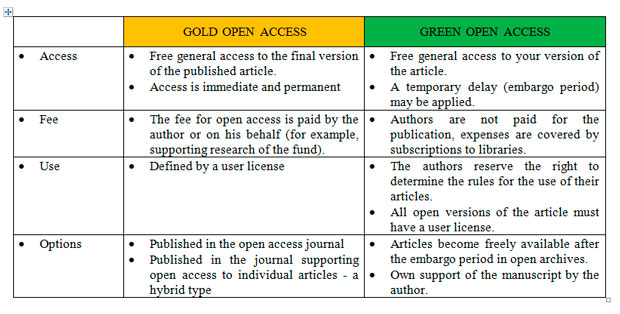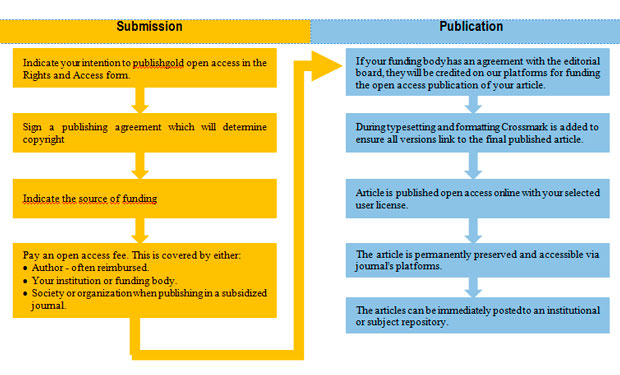Open Access
Article processing charge (APC) – a fee, which is sometimes charged by a scientific journal to compensate for publication costs. To cover publishing costs, scientific journals use different methods. For example, fees from the distribution of subscriptions, subsidies of various organizations. Currently, the number of journals is growing, especially among open access, which accept payment for publications. Moreover, this method of filling the publisher's budget has become the most common method of financing the publication of professional articles.
In the opinion of the Higher Attestation Commission (VAK) of Russia in the person of its head Vladimir Filippov, for the publication of graduate students, in general, should pay a university, which will pass the defense of the thesis.
The main reason forcing authors to place works in open access is an increase in the impact-factor.
Research is paid for by research funds; a published article is more a report of the work done than an object of income. The more used, the article is cited, the more references are made to it and the more work is based on it, the better for the researcher's research and career.
The first important international mention of open access is contained in the Budapest Conference on Open Access in February 2002. It was followed by a statement by Bethesda in June 2003 and the Berlin Declaration on Open Access to Scientific and Humanitarian Knowledge in October 2003.
Budapest Open Access Initiative
An old tradition and a new technology have converged to make possible an unprecedented public good. The old tradition is the willingness of scientists and scholars to publish the fruits of their research in scholarly journals without payment, for the sake of inquiry and knowledge. The new technology is the internet. The public good they make possible is the world-wide electronic distribution of the peer-reviewed journal literature and completely free and unrestricted access to it by all scientists, scholars, teachers, students, and other curious minds. Removing access barriers to this literature will accelerate research, enrich education, share the learning of the rich with the poor and the poor with the rich, make this literature as useful as it can be, and lay the foundation for uniting humanity in a common intellectual conversation and quest for knowledge.
While the peer-reviewed journal literature should be accessible online without cost to readers, it is not costless to produce. However, experiments show that the overall costs of providing open access to this literature are far lower than the costs of traditional forms of dissemination. With such an opportunity to save money and expand the scope of dissemination at the same time, there is today a strong incentive for professional associations, universities, libraries, foundations, and others to embrace open access as a means of advancing their missions.
Our goal is open access to literature that has received peer review. Creating open archives (1) and creating a new generation of alternative open access journals (2) are ways to achieve this goal.
Bethesda Statement on Open Access Publishing
An Open Access Publication is one that meets the following two conditions:
- The author(s) and copyright holder(s) grant(s) to all users a free, irrevocable, worldwide, perpetual right of access to, and a license to copy, use, distribute, transmit and display the work publicly and to make and distribute derivative works, in any digital medium for any responsible purpose, subject to proper attribution of authorship, as well as the right to make small numbers of printed copies for their personal use.
- A complete version of the work and all supplemental materials, including a copy of the permission as stated above, in a suitable standard electronic format is deposited immediately upon initial publication in at least one online repository that is supported by an academic institution, scholarly society, government agency, or other well-established organization that seeks to enable open access, unrestricted distribution, interoperability, and long-term archiving (for the biomedical sciences, PubMed Central is such a repository).
Notes:
- Open access is a property of individual works, not necessarily journals or publishers.
- Community standards, rather than copyright law, will continue to provide the mechanism for enforcement of proper attribution and responsible use of the published work, as they do now.
Berlin Declaration on Open Access to Knowledge in the Sciences and Humanities
Open access contributions must satisfy two conditions: The author(s) and right holder(s) of such contributions grant(s) to all users a free, irrevocable, worldwide, right of access to, and a license to copy, use, distribute, transmit and display the work publicly and to make and distribute derivative works, in any digital medium for any responsible purpose, subject to proper attribution of authorship (community standards, will continue to provide the mechanism for enforcement of proper attribution and responsible use of the published work, as they do now), as well as the right to make small numbers of printed copies for their personal use.
A complete version of the work and all supplemental materials, including a copy of the permission as stated above, in an appropriate standard electronic format is deposited (and thus published) in at least one online repository using suitable technical standards (such as the Open Archive definitions) that is supported and maintained by an academic institution, scholarly society, government agency, or other well-established organization that seeks to enable open access, unrestricted distribution, inter-operability, and long-term archiving.
The difference between Gold and Green types of open access:

Publication of an article in Gold Open Access

CC License Types

